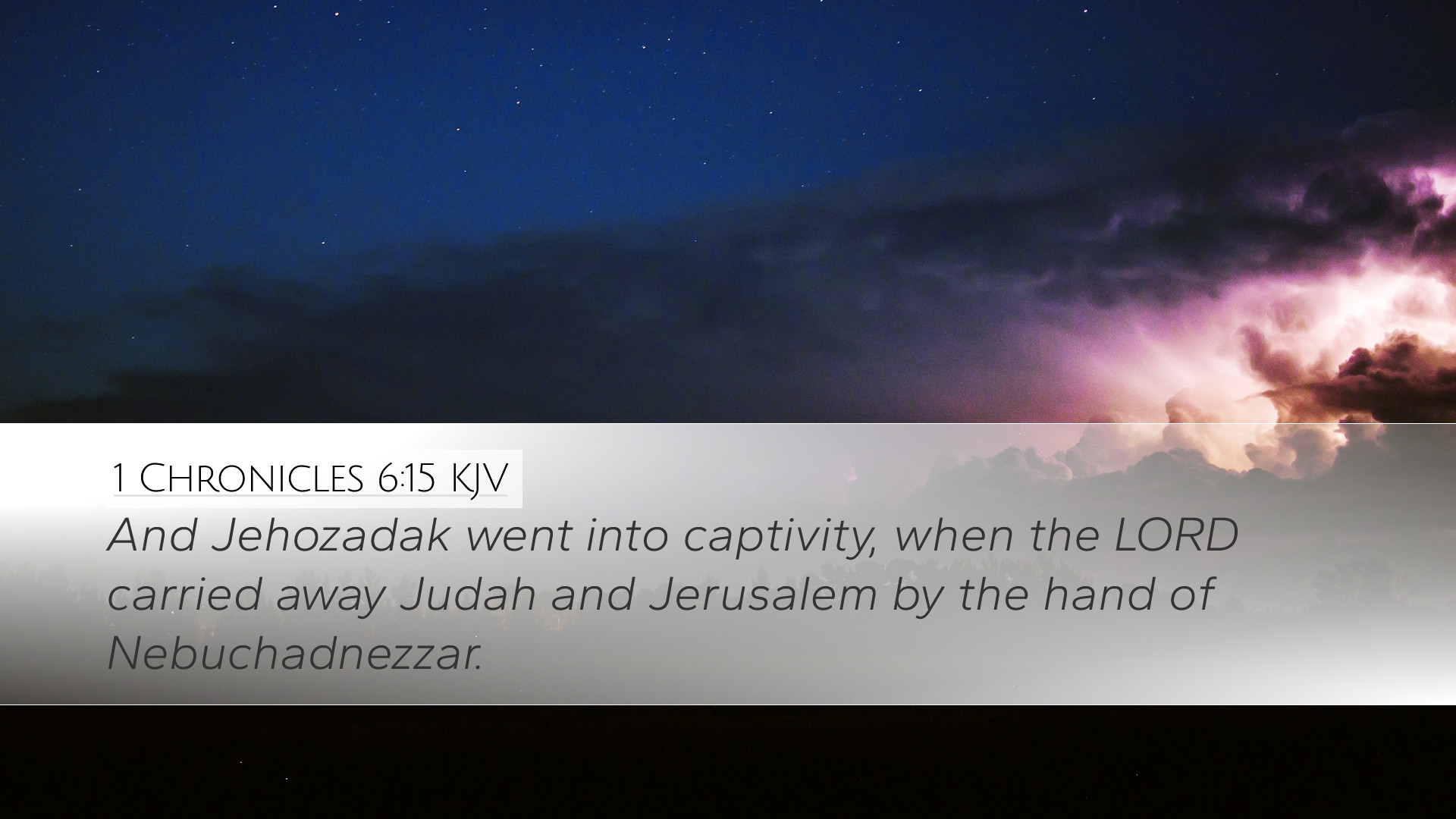Commentary on 1 Chronicles 6:15
Verse: 1 Chronicles 6:15 - "The sons of Jeconiah; Assir, Salathiel his son;"
Introduction
The genealogies in the Chronicles are often seen as intricate and tedious, yet they serve a profound purpose in establishing the
historical and theological context of the Israelite people. 1 Chronicles 6:15 falls within these genealogies, specifically addressing
the lineage stemming from Jeconiah (also known as Jehoiachin), who played a significant role during the Babylonian exile.
Contextual Background
Understanding the significance of 1 Chronicles 6:15 demands familiarity with the broader narrative of the Babylonian captivity and the
subsequent restoration of Israel. The Chronicler writes to a post-exilic audience, seeking to reaffirm their identity as a covenant people
and reminding them of God's faithfulness.
Exegetical Insights
1. Lineage and Significance
The mention of Jeconiah’s sons in 1 Chronicles 6:15 demonstrates the importance of lineage within the Jewish tradition.
Matthew Henry notes that such genealogies serve to affirm the legitimacy of claims to priesthood and kingship. The Chronicler
traces the lineage leading to significant figures in the nation’s history, culminating in the messianic line.
2. Jeconiah’s Historical Role
Jeconiah was the last king of Judah before the Babylonian captivity, and his reign is marked by crisis and divine judgment.
Albert Barnes explains that the mention of Assir and Salathiel as his sons signifies a continuation of the royal line, despite
the dire circumstances of exile. This highlights a thread of hope amidst a dark period in Israel's history—the
promise of restoration and a future king.
3. Theological Themes
Theologically, 1 Chronicles 6:15 addresses themes of preservation and continuity of God's covenant promises.
Adam Clarke elaborates on how, despite the apparent ending of the Davidic line with Jeconiah's exile, God's plan
remains unthwarted. The genealogy serves as a reminder that, through adversity, God preserves a remnant that will ultimately
be restored. This is vital for understanding the unfolding of redemptive history, as it connects the past with the future.
Historical and Theological Analysis
The chronicler’s purpose is to reinforce the identity of Israel as God’s chosen people.
Matthew Henry emphasizes that genealogies function not merely as historical records but also as testimonies to the faithfulness of God,
who preserves His covenant people through generations. In effect, the struggles faced by Jeconiah's descendants symbolize
the broader experiences of God's people throughout history.
Genealogy and Redemption
The line of Jeconiah, culminating in Christ, as detailed in the Gospels, illustrates the divine sovereignty that guides human history.
Albert Barnes highlights how the genealogy in Matthew 1 explicitly traces this lineage, aligning with the prophecies regarding
the Messiah's descent from David. It serves as a powerful reminder that God can bring forth redemption from the most
unexpected circumstances.
The Role of the Remnant
The concept of the remnant is prevalent throughout Scripture, particularly following Israel's disobedience and subsequent judgment.
Adam Clarke interprets the mention of Assir and Salathiel as indicative of God's promise to maintain a faithful remnant, ultimately leading
to the return from Babylon. It encapsulates the idea that, even in exile, God preserves a lineage through which He would fulfill
His covenant promises, leading to the restoration of His people.
Conclusion
In summary, 1 Chronicles 6:15, while brief and seemingly straightforward, encapsulates essential themes of hope, preservation, and
divine sovereignty. Through the Israelite genealogy, the Chronicler imparts deep theological truths that resonate throughout the entire
biblical narrative. As we reflect on this verse, we are reminded of the faithful God who guides His people through the complexities
of history, ensuring that His redemptive plan continues to unfold.
Reflection for Pastors and Theologians
For pastors and theologians, this passage encourages a deeper exploration of how genealogies contribute to the overarching narrative of
Scripture. It calls for an understanding of God's faithfulness through generations, assuring believers of His unchanging nature
amid life's adversities. In teaching, it also emphasizes the importance of connecting the Old Testament history to the New Testament
fulfillment in Christ, reinforcing the unified message of redemption found in the entire biblical text.


